|
 Posted: December 04, 2003 Posted: December 04, 2003
Author: Jason Kohrs
Manufacturer: PC Toys
Sponsor: PC Toys
As usual, this power supply did not escape the test bench without having its shell cracked open. Inside you will find no special features like potentiometers for adjusting voltage rail strengths, just the basic features for providing power and keeping things cool.
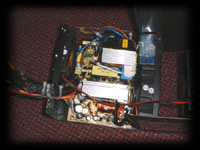
As should be expected with any power supply, installation was a snap. The two images below show the unit installed in an Enermax CS-10182 server case (the flex loom shown in the below left image was my own addition, and not included with the psu).
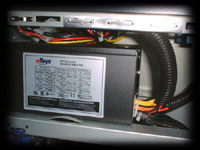 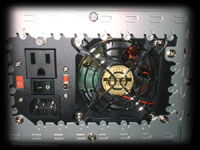
In addition to the PC Toys power supply and Enermax case, the following components will be featured in the testing portion of the review:
• AMD Athlon XP2200+ Processor
• Shuttle AN35N Ultra nForce2 Ultra 400 Motherboard
• (2) Maxtor 40GB ATA-133 Hard Drives
• Lite-On CD-RW Drive
• Artec DVD Drive
• (4) 80 mm LED case fans and (2) 80 mm black case fans
• Thermalright SLK-800U with 80 mm Thermaltake SmartFan II
• (3) Cards: PCI Sound, PCI TV Tuner, AGP Video
The testing of the power supply will be focused on determining how much the main voltage rails fluctuate from idle conditions to full load conditions. I used a Radio Shack multi-meter, Cat. No. 22-810 (pictured below), to record all of the voltage readings, and results were recorded from the +5V, +3.3V, and +12V rails with the system idling, as well as with the system under full load utilizing SiSoft Sandra Max3!.
The Burn-in Wizard of Sandra allows you to stress test various components in your system, which increases the power required by each. I allowed the tests shown below to run for a minimum of 10 loops, and monitored the voltage rails of the psu for spikes.
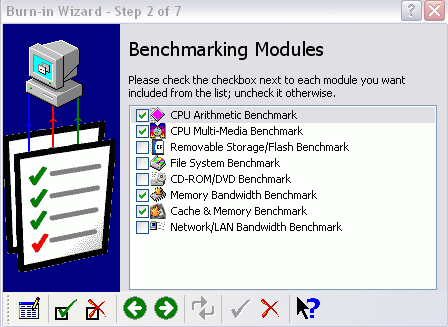
Physically, the multi-meter was connected directly to the back of the 20-pin ATX motherboard connector, with the black lead placed on a black wired socket. Separately I placed the red lead on a red wired socket for the 5v rail reading, a yellow wired socket for the 12V line reading, and an orange wired socket for the 3.3V line reading. For comparison purposes, these steps were repeated on the PC Toys 470W power supply as well as on the Enlight 420W, and Allied 500W both of which were recently reviewed at BigBruin.Com. Details of the results are provided in the table below for all three units.

As you can see in the table above, the 12V and 5V rails of the PC Toys unit are far lower than either of the two competitors. The results are still well within the generally accepted range of +/- 10%, but knowing that these other two units packed more punch doesn’t reflect favorably on the PowerMaxx 470. The graph below shows the results from the table above so that you can see the individual lines side-by-side, while at full load.
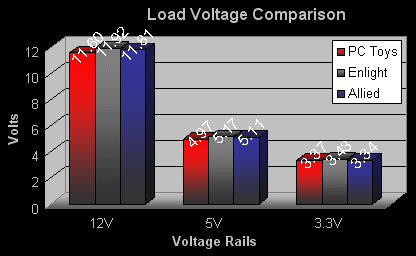
The graph below shows a comparison of only the PC Toys unit’s rails while at idle and load. One can see that although the 5V and 3.3V lines didn’t budge, the 12V line did drop, which isn’t alarming since it dropped by about the same amount as the other two units tested.
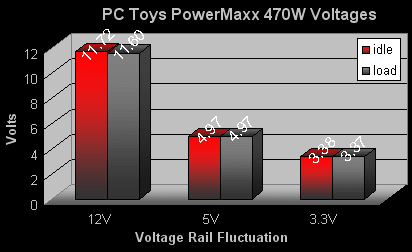
The performance of the PowerMaxx 470 did not suffer due to the the voltage readings being lower than the other two units tested, but the weaker readings did leave some concern in the back of my mind. Despite my worries, there were no issues with instability, and to be honest the results are well within spec and should be just fine.
Other than the lower than desirable voltage lines, the other main knock against the PowerMaxx 470 is the price. Available from PC Toys directly (or from their various official retailers) for $79.95, it is a good deal more money than comparable units including the two it was tested against. The Enlight 420W is currently available for less than $50 US from various retailers, and the Allied 500W is currently available for around $55 US from some of the same retailers. I mentioned previously that the PowerMaxx 470 is the same unit as the Vantec Stealth VAN-470A, but a comparison of their prices shows that the PC Toys version of this product weighs in a few dollars cheaper.
Despite lower than expected voltage readings, the PC Toys PowerMaxx 470 provided reliable power with no stability issues during testing and subsequent use. Nice features such as the AC outlet, fan speed controller, and an abundance of internal power connections make it appealing for use in just about any situation.
Pros
• 3 variable speed cooling fans lets you balance noise/cooling level
• More than enough power connections, with ample lead lengths
• Pass through AC outlet is very convenient
• Black aluminum housing with meshed ATX cord look pretty stylish
• Includes ATX adaptor for use on server motherboards
Cons
• Voltage rails are within specification, but weaker than I am used to seeing
• High speed fan setting is way too loud to be used comfortably
• Priced higher than comparable units
Please drop by the BigBruin.Com Forum and feel free to discuss this review.
Page 1 | Page 2 | Forum | Review Index
|